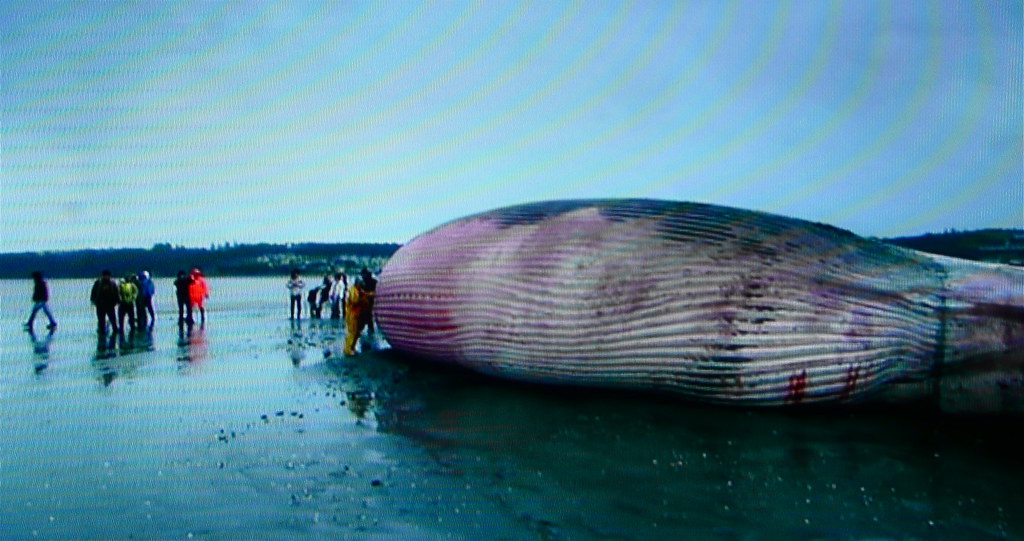For thousands of years, the practice of hunting whales was exceptionally common. The animals were killed for meat, and, later, for blubber that could be converted into oil—an increasingly valued commodity during the industrial revolution. While whaling provided tremendous benefits to human beings, the practice was, of course, devastating to whale populations and to individual whales. Arguments against the practice were ready at hand. A number of species, such as grays and humpbacks, were being hunted into near extinction. The reduction of the whale population led to changes in aquatic ecosystems. What’s more, the practice was cruel—whaling equipment was crude and violent. Whales under attack often died slowly and painfully and plenty of harpooned whales were seriously injured rather than killed, causing them pain and diminishing the quality of their lives. To complicate matters, whales have enormous brains and live complex social lives. There is much that we don’t know about whale cognition, but there is at least a compelling case to be made that they are very intelligent.
Most countries have banned the practice of whaling, though some native tribes are allowed to continue the practice on a subsistence basis. One might think that we came to see the error of our ways. Surely, the true, unwavering light of reason guided us toward mercy toward our Cetacean friends? After all, the case in question raises fundamental philosophical questions. In virtue of what features is a being deserving of moral consideration? How should we balance human comfort and well-being against the suffering of non-human animals harmed in its attainment? How much collateral damage is too much collateral damage?
Alas, as Paul Shapiro points out in his book, Clean Meat, it was market forces rather than philosophical arguments that led to the slow decline of whaling practices. When alternative sources of energy, such as kerosene, became cheaper and more readily available than whale oil, consumers quickly changed their consumption habits. So, it was only after a viable alternative became available that people were finally willing to listen to the ethical arguments against the practice.
The way in which the practice of whaling fell into disrepute is a key case study for reflection on an interesting and important set of questions, some empirical and some philosophical. Is it common for people to be motivated by the sheer strength of moral reasons? Are moral considerations hopelessly secondary to concerns related to convenience? If we assume that desirable moral outcomes exist (the reduction of suffering is a plausible candidate), are we justified in changing moral attitudes by manipulating markets? How much time and effort should we spend persuading people to change their consumption habits for moral reasons?
These questions are increasingly salient. In years past, our species had the power to usher in the end of days for countless species. Indeed, technological advances have made it possible for our species to usher in the end of days for life on earth, full stop. We have created products and procedures that pollute our oceans and fundamentally change our atmosphere. What should we do in response?
One might think that the severity of the problem should give rise to a paradigm shift—a move, once and for all, away from the anthropocentric worldview that put us where we are. This would involve seeing our actions and ourselves as part of a larger biosphere. Once we adopted this view, we would recognize that resources are global, and we are just a small, albeit fulminant, part of that larger system. The fact that our actions have consequences for others may also lead to a shift in the way we think about our moral spheres of influence. Rather than thinking of moral obligation as a local matter, we may start to think about the consequences our actions have for populations in locations more impacted by climate change. We may also think about the impact our behavior has on the non-human life occupying the global ecosystem.
Or…not. It may be that such a shift fails to take root. Admittedly, this is philosophically dissatisfying. There seems to be something noble and admirable about living a Socratic life—about knowing oneself and living an examined life. This entails a willingness to reflect on one’s own biases, a disposition to reflect on what is good, all things considered, and to pursue that good.
For change to happen in the way I’ve just described requires change to happen from within. In this case, our behavior would change by way of what philosopher John Stuart Mill would call an “internal sanction”—we would be motivated to do what is good out of sheer recognition that the thing in question is good. In the absence of internal sanctions, however, external sanctions may be not just appropriate, but crucial. A change in market forces eventually led to conditions under which people could be convinced that whaling was a moral atrocity that needed to be outlawed. Perhaps similar market changes can make the difference with regard to crucial moral issues today. Perhaps if there are viable alternatives to the consumption of flesh, people will open their eyes to the horrors of factory farms. If there are compostable or reusable alternatives to single use plastics, perhaps that will open the door to a change in attitude about the way our consumption habits affect the planet.
The problem with this approach is that important moral change becomes dependent on non-moral features of the market. The alternative options must be affordable, marketable, and, ultimately, popular. What’s more, though the market might be useful for transmitting values, there is nothing inherently moral about it—it can make popular corrosive, ugly change just as easily as it can promote moral progress. In the end, if the market change doesn’t stick, neither does the moral change.

